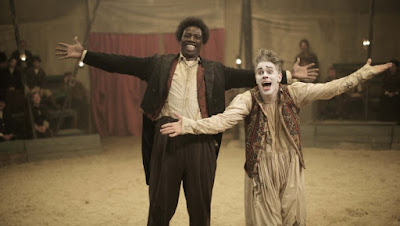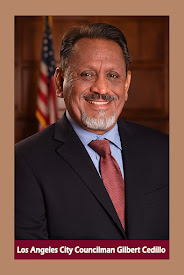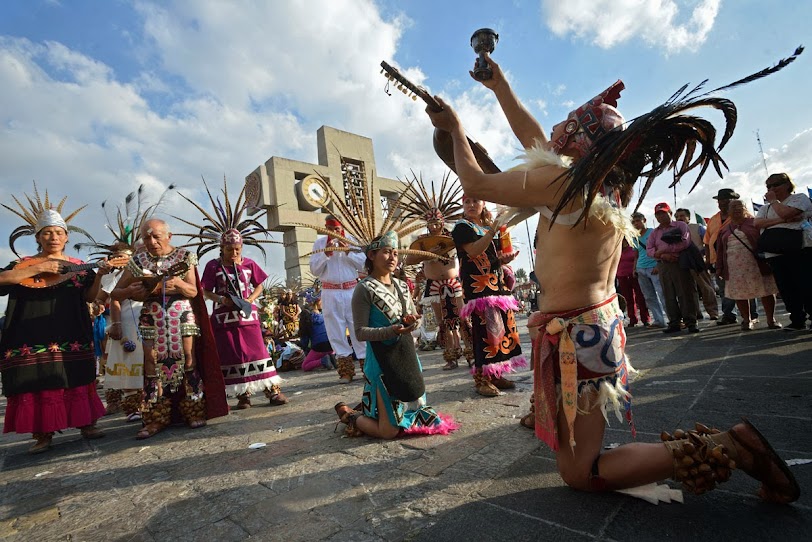Latino Stories at COLCOA French Film Festival
by William Alexander Yankes
The annual French film festival, COLCOA (the abbreviation for City of Lights, City of Angels), that honors the ever-stronger bond between the world’s two film capitals—Paris and Los Angeles—celebrated its 18th year at the Directors’ Guild of America in 2014. Traditionally held after the Oscars, COLCOA devotes just over a week in April, nine days which are anticipated with baited breath all year by cinephiles and Francophiles alike, to showcasing the very best of contemporary French filmmaking. (Photo courtesy of Gaumont.)
Two years ago, on April 20th, the curtains opened on the first night of the annual festival to a full house. The standing room-only crowd was eager, as always, to spend a week witnessing and celebrating films infused with poetry, humor, candor, pathos, passion, sex and, yes, a most French ingredient, love.
On that night in particular, François Truffart, COLCOA director, announced the presence of Claude Lelouch, director of the 1966 Oscar-winning film, A Man and a Woman. The revered French film director, whose appearance had not been previously announced, stood up among the audience to a heart-warming ovation. Moments later, the lights dimmed for the premier of Lelouch’s latest film, Salaud, on t’aime (We Love You, Bastard).
This year, COLCOA is proud to announce the return of Lelouch. In commemoration of the festival’s 20th anniversary, he reprises his previous appearances with another love story, Un Plus Une, meaning “he and she.” A slate of 70 films and TV series comprise the 2016 edition of what has become regarded as one of the most elegant and creative annual film gatherings to which Hollywood plays host.
As part of the “World Series Produced by France Series,” two Latin American stories take center stage at the dawn of COLCOA’s 3rd decade. Monsieur Chocolat, (Chocolat), written and directed by Roschdy Zem and co-starring Charlie Chaplin’s grandson James Thierré, inaugurates the festival with its world-premier at the opening night gala. A timely story, particularly in the U.S. in light of the #blacklivesmatter movement, the film is based on the tragic true life story of Rafael Padilla, an Afro-Cuban slave—played by Omar Sy—who made his way to France in the late 1800s and became a celebrity clown as part of a duo opposite the character played by Thierré.
The politically and psychologically charged Argentine film, Eva Doesn’t Sleep (Eva No Duerme), a nearly experimental film, directed by Pablo Agüero and starring Gael García Bernal completes the pairing in a nod to the growing influence of Latino cinema around the globe. The film, also a true story, delves into the theft of Eva Peron's body and the cult obsession that formed around her in life, a phenomenon which grew more epic after her death.
In all, forty features, documentaries and shorts will have their exclusive screenings this month. The film selections include documentaries and wildly creative shorts, both part of a long COLCOA tradition. The features range from sublime elegance to raw seediness representing the panoply of life.
A representation of the quintessential French artistic temperament—an increasingly cosmopolitan one by virtue of migrations to France from the world’s four corners, COLCOA makes it a point to acknowledge contemporary issues gripping Europe’s multi-ethnic diversity by inviting works that reflect contemporary French life. Complementing the wealth of film choices, festival-goers are provided with a delightful sampling of French wines, Hollywood Blonde beers, cheeses, as well as the ever-delicate and perennial crêpes and macaroons. At the conclusion of every festival, a 20-foot-long cake is served to the public, perhaps in a literal, tongue-in-cheek reference to the famous quote by Marie Antoinette, “Let them eat cake!” However, French elegance, a great diversity of films and culinary hospitality remain COLCOA’s stock-in-trade vintage diplomacy.
My own reasons for attending the festival of French film and culture do not involve just the eyes and the palate. I also enjoy encountering people I last saw during previous festival years. Among the film buffs are sculptors, composers and dreamers of every persuasion. These are faces that, in time, become acquaintances and friends. Plunging into the sound of French spoken in the theater lobby and in the dimly lit theater just before the films are projected is part of my cultural submersion. Being kissed on each cheek by French women—who expect reciprocity when greeting someone in that traditional manner—is part of the fun; it is just as we see on the screen. Even men kiss each other on the cheek, and while a bit much for my Anglo-Saxon and Latinized male reserve, it is equally indicative of the French gentility.
Fortunate to speak more than one language—regrettably, French isn't among them—I am still captivated by the sound of French being spoken all around me at the festival. The experience reminds me that the world is more complex, more vibrant than my daily American routine. With COLCOA, we travel the globe without ever having to leave Los Angeles. These screenings treat us to a rich cornucopia filled with films from every genre that, while perhaps French-centric, open a window to other cultures.
Another aspect of the endearing festival reveals itself as a function of social activism and a commitment to making cinema less elite and more egalitarian. Every year, yellow school buses line up in front of the DGA building in West Hollywood, bringing thousands of inner-city school children to see a movie, introducing them in this way to the world of foreign film.
This French festival is a veritable cinematic vacation where film enthusiasts can see up to three, four or more movies a day, some of them free. The caliber of their artistic merit alone is enough to transport audience members viscerally and emotionally during a week of indisputable magic.
Reach the author at wa.yankes@gmail.com or visit www.WilliamAlexanderYankes.com
The annual French film festival, COLCOA (the abbreviation for City of Lights, City of Angels), that honors the ever-stronger bond between the world’s two film capitals—Paris and Los Angeles—celebrated its 18th year at the Directors’ Guild of America in 2014. Traditionally held after the Oscars, COLCOA devotes just over a week in April, nine days which are anticipated with baited breath all year by cinephiles and Francophiles alike, to showcasing the very best of contemporary French filmmaking. (Photo courtesy of Gaumont.)
Two years ago, on April 20th, the curtains opened on the first night of the annual festival to a full house. The standing room-only crowd was eager, as always, to spend a week witnessing and celebrating films infused with poetry, humor, candor, pathos, passion, sex and, yes, a most French ingredient, love.
On that night in particular, François Truffart, COLCOA director, announced the presence of Claude Lelouch, director of the 1966 Oscar-winning film, A Man and a Woman. The revered French film director, whose appearance had not been previously announced, stood up among the audience to a heart-warming ovation. Moments later, the lights dimmed for the premier of Lelouch’s latest film, Salaud, on t’aime (We Love You, Bastard).
This year, COLCOA is proud to announce the return of Lelouch. In commemoration of the festival’s 20th anniversary, he reprises his previous appearances with another love story, Un Plus Une, meaning “he and she.” A slate of 70 films and TV series comprise the 2016 edition of what has become regarded as one of the most elegant and creative annual film gatherings to which Hollywood plays host.
As part of the “World Series Produced by France Series,” two Latin American stories take center stage at the dawn of COLCOA’s 3rd decade. Monsieur Chocolat, (Chocolat), written and directed by Roschdy Zem and co-starring Charlie Chaplin’s grandson James Thierré, inaugurates the festival with its world-premier at the opening night gala. A timely story, particularly in the U.S. in light of the #blacklivesmatter movement, the film is based on the tragic true life story of Rafael Padilla, an Afro-Cuban slave—played by Omar Sy—who made his way to France in the late 1800s and became a celebrity clown as part of a duo opposite the character played by Thierré.
 |
| Imanol Arias as Dr. Pedro Ara embalms Peron's body (Sabrina Macchi). |
In all, forty features, documentaries and shorts will have their exclusive screenings this month. The film selections include documentaries and wildly creative shorts, both part of a long COLCOA tradition. The features range from sublime elegance to raw seediness representing the panoply of life.
A representation of the quintessential French artistic temperament—an increasingly cosmopolitan one by virtue of migrations to France from the world’s four corners, COLCOA makes it a point to acknowledge contemporary issues gripping Europe’s multi-ethnic diversity by inviting works that reflect contemporary French life. Complementing the wealth of film choices, festival-goers are provided with a delightful sampling of French wines, Hollywood Blonde beers, cheeses, as well as the ever-delicate and perennial crêpes and macaroons. At the conclusion of every festival, a 20-foot-long cake is served to the public, perhaps in a literal, tongue-in-cheek reference to the famous quote by Marie Antoinette, “Let them eat cake!” However, French elegance, a great diversity of films and culinary hospitality remain COLCOA’s stock-in-trade vintage diplomacy.
My own reasons for attending the festival of French film and culture do not involve just the eyes and the palate. I also enjoy encountering people I last saw during previous festival years. Among the film buffs are sculptors, composers and dreamers of every persuasion. These are faces that, in time, become acquaintances and friends. Plunging into the sound of French spoken in the theater lobby and in the dimly lit theater just before the films are projected is part of my cultural submersion. Being kissed on each cheek by French women—who expect reciprocity when greeting someone in that traditional manner—is part of the fun; it is just as we see on the screen. Even men kiss each other on the cheek, and while a bit much for my Anglo-Saxon and Latinized male reserve, it is equally indicative of the French gentility.
Fortunate to speak more than one language—regrettably, French isn't among them—I am still captivated by the sound of French being spoken all around me at the festival. The experience reminds me that the world is more complex, more vibrant than my daily American routine. With COLCOA, we travel the globe without ever having to leave Los Angeles. These screenings treat us to a rich cornucopia filled with films from every genre that, while perhaps French-centric, open a window to other cultures.
Another aspect of the endearing festival reveals itself as a function of social activism and a commitment to making cinema less elite and more egalitarian. Every year, yellow school buses line up in front of the DGA building in West Hollywood, bringing thousands of inner-city school children to see a movie, introducing them in this way to the world of foreign film.
This French festival is a veritable cinematic vacation where film enthusiasts can see up to three, four or more movies a day, some of them free. The caliber of their artistic merit alone is enough to transport audience members viscerally and emotionally during a week of indisputable magic.
Reach the author at wa.yankes@gmail.com or visit www.WilliamAlexanderYankes.com





Comments
Post a Comment